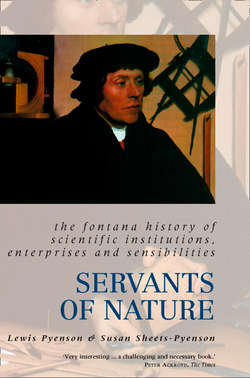Servants of Nature: A History of Scientific Institutions, Enterprises and Sensibilities

Реклама. ООО «ЛитРес», ИНН: 7719571260.
Оглавление
Lewis Pyenson. Servants of Nature: A History of Scientific Institutions, Enterprises and Sensibilities
SERVANTS OF NATURE. A History of Scientific Institutions, Enterprises and Sensibilities. LEWIS PYENSON. and. SUSAN SHEETS-PYENSON
COPYRIGHT
PRAISE
CONTENTS
PREFACE
Introduction: Science and Its Past
1 Teaching: Before the Scientific Revolution
2 Teaching: From the Time of the Scientific Revolution
3 Sharing: Early Scientific Societies
4 Watching: Observatories in the Middle East, China, Europe and America
5 Showing: Museums
6 Growing: Botanical Gardens and Zoos
7 Measuring: The Search for Precision
8 Reading: Books and the Spread of Ideas
9 Travelling: Discovery, Maps and Scientific Exploration
10 Counting: Statistics
11 Killing: Science and the Military
12 Participating: Beyond Scientific Societies
13 Appropriating: Science in Nations Beyond Europe
14 Believing: Science and Religion
15 Knowing: Progressing and Proclaiming
16 Knowing: Relativizing
FURTHER READING. INTRODUCTION
CHAPTER 1
CHAPTER 2
CHAPTER 3
CHAPTER 4
CHAPTER 5
CHAPTER 6
CHAPTER 7
CHAPTER 8
CHAPTER 9
CHAPTER 10
CHAPTER 11
CHAPTER 12
CHAPTER 13
CHAPTER 14
CHAPTER 15
CHAPTER 16
INDEX
ABOUT THE AUTHOR. SERVANTS OF NATURE
NOTES
INTRODUCTION
CHAPTER 1
CHAPTER 2
CHAPTER 3
CHAPTER 5
CHAPTER 6
CHAPTER 7
CHAPTER 8
CHAPTER 9
CHAPTER 10
CHAPTER 11
CHAPTER 12
CHAPTER 13
CHAPTER 14
CHAPTER 15
CHAPTER 16
THE FONTANA HISTORY OF SCIENCE SERIES
ABOUT THE PUBLISHER
Отрывок из книги
‘A considerable achievement.’ CASPAR HENDERSON, New Scientist
‘At best a heroic visionary, at worst a megalomaniac Frankenstein: either way triumphant individualism is taken for granted in the stereotypical scientist. So too is the disinterested purity of research conducted under lab conditions, all external considerations excluded like so many bacteria from a sterile vessel. Yet the reality has always been quite otherwise: the world refuses to stop at the laboratory door, and that has led to some of science’s greatest breakthroughs as well as its worst abuses. This highly readable, subtle and thought-provoking scientific history goes beyond whistle-blowing to consider more subtle and ultimately perhaps more interesting questions of how a changing institutional context has constrained the content and direction of we too unquestioningly take to be ‘pure’ science.’
.....
A century of wonders
The new encyclopaedia
.....